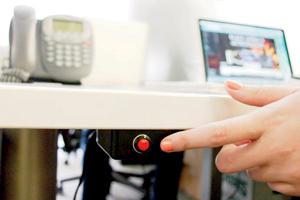mid-day surveys alarm security system at major BMC hospitals, installed to protect doctors from relatives on a rampage. And the result is, well, alarming


The JJ hospital doctors were assaulted in ward number 11
ADVERTISEMENT
Days after two doctors at JJ Hospital were assaulted by a patient's relatives, doctors across the city are on red alert. mid-day found that while JJ still does not have a security alarm, doctors at four major BMC hospitals — KEM, Sion, Nair and Cooper — are keeping the guards busy by hitting the panic button over the smallest of issues, afraid that help might not reach them in time.
Since Saturday, doctors have been pressing the panic buttons non-stop, sending the security guards and police running helter-skelter. These were mostly false alarms — tense doctors were triggering the alarm upon the smallest argument with patients, while some were merely testing the security system.
"As soon as the news of the assault at JJ was reported on Saturday, we started hearing the alarms. When we rushed to the spot, we were informed that the panicked doctors were testing the bell," said a police officer inside KEM hospital.

Doctors at the four major BMC hospitals currently have panic buttons in the ICU, operation theatres and emergency wards
KEM, Sion, Nair and Cooper hospitals are the BMC's big four facilities that provide treatment to over 60 per cent patients in the city. All four have been equipped with panic buttons, but mid-day found these inadequate.
At KEM, the alarm bells are installed in the emergency wards, the intensive care unit (ICU) and the operation theatres. Doctors usually punch the red panic button when the crowd gets overwhelming, or anyone threatens staffers on duty. But now the slightest thing sets the alarm bells ringing, literally. When mid-day visited the hospital yesterday, by 5 pm, the alarm had already gone off 12 times at the casualty ward. This includes the times doctors were checking whether the alarm was functioning.
Guards work up a sweat
"The doctors are scared. Even after an argument with patients' relatives, they are pressing the emergency bell, as they don't want to take the risk of getting beaten up," said a senior doctor from KEM.
With the doctors keeping them busy, the security guards are too tense to even go to the washroom. "Since Sunday, the bells have been ringing every half hour. We have to rush to the spot at the earliest to prevent any volatile situation. Now, we think twice before going to the washroom, worried we might fail to attend to an emergency," said a guard.

At KEM, the panic button has been going off every half hour
Meanwhile, with the resident doctors' strike now past the third day, the fraternity has pointed out flaws with the current security system, and demanded centralised security system that will cover the entire facility and help the guards pinpoint the exact location of the disturbance.
At Sion and Nair hospitals, identifying the source of the alarm is often confusing for the guards, which delays their response. For example, when an alarm goes off, the guards have no way of knowing which department is in trouble. They follow the sound of the bell until they find the source of panic.
"The alarms have been tested, and they work perfectly fine. However, there are some flaws that need to be addressed. When the alarm goes off, it takes time to search where it is ringing, and then the guards proceed there. In an emergency, this is a loss of time that needs to be addressed," said a committee member of MARD, Sion.
At Cooper, a senior official stated that the security emergency bell is operational 24x7. "We have installed it at crucial points, and in times of trouble, the staffers can press the button and alert the security guards," said hospital authorities.
Wards on guard
None of the hospitals have alarms in the patient wards. Currently, there is only a buzzer to call nurses or ward boys. It does not connect to the security guards.
Ironically, at JJ hospital, it was in ward no. 11 that Dr Atish Parikh and a woman doctor were assaulted by the relatives of Zaida Sanaullah Sheikh, 45, who died during gall bladder treatment.
"If you see the video of the JJ hospital assault, there were no security guards for over 15 minutes. The relatives threw away all the things on the table. Without a panic button in the ward, how do you expect a doctor to call the security from the landline? Inside wards, mobile network also remains weak. This is the basic security parameter that all hospitals should have," said Dr Akash Mane, general secretary of MARD.
 Subscribe today by clicking the link and stay updated with the latest news!" Click here!
Subscribe today by clicking the link and stay updated with the latest news!" Click here!






